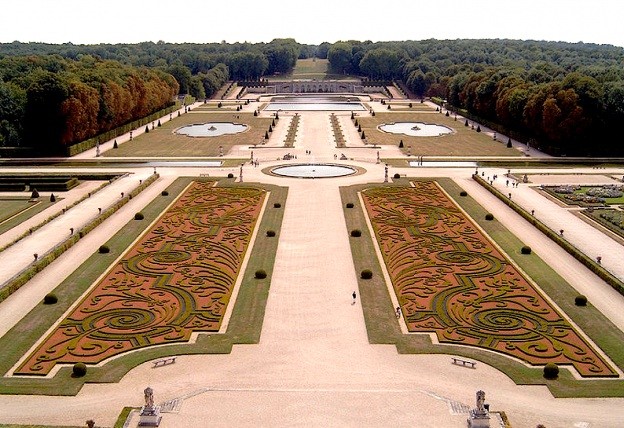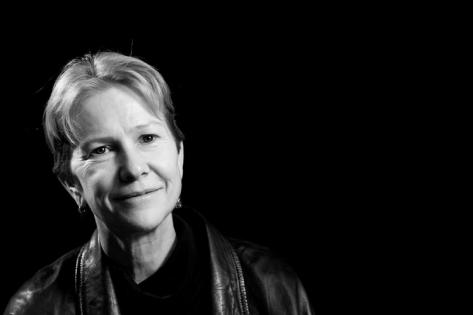
Where the real exceeds the ideal (PoemTalk #52)
Cole Swensen, 'If a Garden of Numbers'

Cole Swensen’s book Ours is a sequence of poems — or is perhaps best described as a poetic project. André Le Nôtre (1613-1700) was the principal gardener of King Louis XIV; he designed and led the construction of the park of the Palace of Versailles. The poems in Swensen’s book indicate a range of interests in Le Nôtre’s work and beyond, but his Gardens of the Château de Vaux-le-Vicomte are of special interest, and they are the topic of the poem we chose to discuss, “If a Garden of Numbers.” The poem, and our talk about it, raised a number of compelling questions. Are historical research and the lyric compatible?
 (Yes, we agreed. But what are the varieties of integrating the two? And how does a scholarly methodology knowingly bespeak what was once super-elite art —
(Yes, we agreed. But what are the varieties of integrating the two? And how does a scholarly methodology knowingly bespeak what was once super-elite art —  namely, Le Nôtre's?) Can the hyper-rational garden be truly “ours,” ever? (The master landscape designer's name is a pun on that possessive form of liberalism’s favorite pronoun from the French Revolution onward. This pun is a key to understanding Swensen’s poem and indeed the whole book.) If — to quote Swensen channeling Louis XIV — “it was an age that felt that nature could be corrected,” does such an urge extend to the formalities of poetry? If Le Nôtre “couldn't stand views that end,” what effect should that have on a poetics? The idea that the garden includes everything you can see from the garden has some kind of political valence: progressive if what’s beyond the garden can and must be welcomed in, if natural emigration is really possible (by virtue of its design, notwithstanding the exclusivity of its original patron); conservative if Le Nôtre's act of inclusion colonizes nature beyond its border. If the latter, then is form as a kind of artifice inherently conservative? Le Nôtre’s “jar in Tennessee” problem means that form takes dominion everywhere, even if the slovenly wilderness grows up all around it. One needn’t beat it back. One need only place the form in its midst. Finally: If art is an idea as distinct from nature, and if the “real exceeds the ideal,” then can a poem of ideas about nature be aligned with the real? We’re back to hyper-rationality. These gardens are beautifully excessive, and so — Swensen seems to contend, but arguably — they get at humanity because indeed they produce a version of reality rather than (merely) ideality. Subjectivity is affirmed. Every slight shift in perspective matters a great deal. The garden (the poem too?) is a way of making nature account for the mind.
namely, Le Nôtre's?) Can the hyper-rational garden be truly “ours,” ever? (The master landscape designer's name is a pun on that possessive form of liberalism’s favorite pronoun from the French Revolution onward. This pun is a key to understanding Swensen’s poem and indeed the whole book.) If — to quote Swensen channeling Louis XIV — “it was an age that felt that nature could be corrected,” does such an urge extend to the formalities of poetry? If Le Nôtre “couldn't stand views that end,” what effect should that have on a poetics? The idea that the garden includes everything you can see from the garden has some kind of political valence: progressive if what’s beyond the garden can and must be welcomed in, if natural emigration is really possible (by virtue of its design, notwithstanding the exclusivity of its original patron); conservative if Le Nôtre's act of inclusion colonizes nature beyond its border. If the latter, then is form as a kind of artifice inherently conservative? Le Nôtre’s “jar in Tennessee” problem means that form takes dominion everywhere, even if the slovenly wilderness grows up all around it. One needn’t beat it back. One need only place the form in its midst. Finally: If art is an idea as distinct from nature, and if the “real exceeds the ideal,” then can a poem of ideas about nature be aligned with the real? We’re back to hyper-rationality. These gardens are beautifully excessive, and so — Swensen seems to contend, but arguably — they get at humanity because indeed they produce a version of reality rather than (merely) ideality. Subjectivity is affirmed. Every slight shift in perspective matters a great deal. The garden (the poem too?) is a way of making nature account for the mind.
 Ann Seaton, Michelle Taransky, and Gregory Djanikian joined Al Filreis for this discussion. We went hard at all the questions enumerated above, expressing doubts about the progressive claim implicit in the pun on “ours.” We pondered the aesthetics and ethics of the garden that includes everything one can see from the garden. Annie offered a political reading, and the others responded, both agreeing and pressing back. Fortunately for us and for PoemTalk listeners, Cole Swensen was interviewed about this work by Leonard Schwartz for one of his “Cross-Cultural Poetics” shows, and so our varying interpretations can benefit from a rich context of resources and responses. Here, below, are relevant audio segments from that radio broadcast:
Ann Seaton, Michelle Taransky, and Gregory Djanikian joined Al Filreis for this discussion. We went hard at all the questions enumerated above, expressing doubts about the progressive claim implicit in the pun on “ours.” We pondered the aesthetics and ethics of the garden that includes everything one can see from the garden. Annie offered a political reading, and the others responded, both agreeing and pressing back. Fortunately for us and for PoemTalk listeners, Cole Swensen was interviewed about this work by Leonard Schwartz for one of his “Cross-Cultural Poetics” shows, and so our varying interpretations can benefit from a rich context of resources and responses. Here, below, are relevant audio segments from that radio broadcast:
- introduction and discussion of the Le Nôtre gardens (5:12): MP3
- brief note on the style of “A Garden Is a Start” (1:40): MP3
- “A Garden Is a Start” (3:12): MP3
- discussion of the language of fact in poetry (8:05): MP3
- “Paradise” (0:56): MP3
- discussion of gardens as dominion over nature (2:43): MP3
- discussion of the geometry of the Le Notre gardens (3:38): MP3
- introductory discussion to “Versailles the Unfurled” (2:53): MP3
- “Versailles the Unfurled” (3:56): MP3
- dicussion of fountains and water as a public and private commodity (5:42): MP3
- “Keeping Track of Distance” (with a brief introduction) (1:40): MP3
During that same discussion, Swensen read our poem: MP3. The text of the poem is available at the Poetry Foundation site: text. Cole Swensen has responded to this episode of PoemTalk: here is a link to her note.
Max McKenna was our engineer for this episode of PoemTalk, and Steve McLaughlin was, as always, our editor.